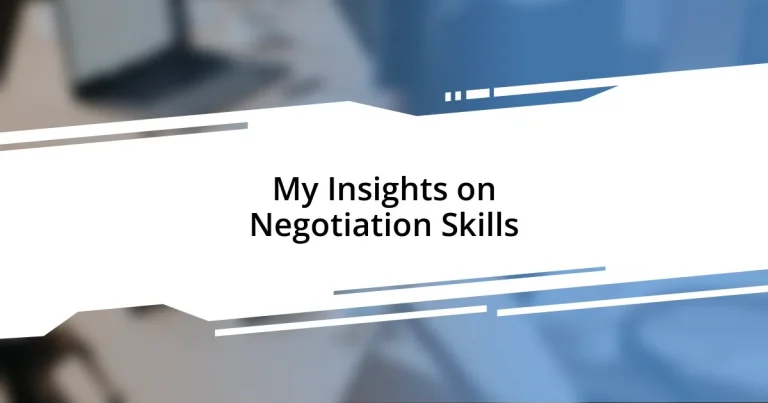Key takeaways:
- Negotiation is essential for building relationships and fostering collaboration, not just for reaching agreements.
- Key skills for effective negotiation include active listening, emotional intelligence, clear communication, problem-solving, and flexibility.
- Preparation is crucial; researching, prioritizing objectives, and visualizing success can enhance confidence and clear focus during negotiations.
- Confidence in closing deals stems from maintaining rapport, clarity in communication, and aligning mutual goals.
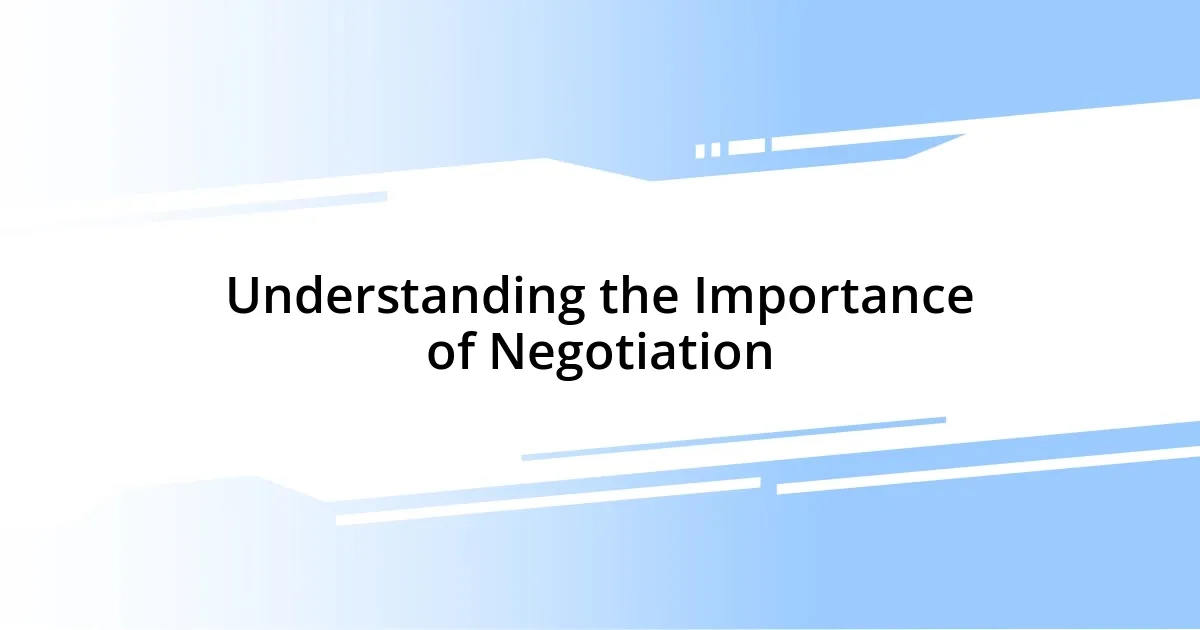
Understanding the Importance of Negotiation
Negotiation is vital in both personal and professional realms, acting as a bridge that connects differing perspectives. I remember negotiating my first salary; it felt intimidating, yet exhilarating. The conversation opened up a world of possibilities and showed me just how crucial it is to advocate for oneself. Wouldn’t you want to have that same feeling of empowerment?
Every time I engage in a negotiation, I realize it’s not just about reaching an agreement; it’s more about fostering relationships. For instance, during a community project, I found that listening actively to others’ viewpoints led to better results than I initially expected. It dawned on me that building rapport can create a win-win situation.
The importance of negotiation extends beyond mere transactions; it affects our day-to-day lives. Have you ever felt overlooked in a conversation? It’s in those moments that a solid negotiation skillset shines. I’ve often found that when I articulate my thoughts clearly while respecting others’, I pave the way for more meaningful dialogue. The ability to negotiate effectively really does craft a more collaborative environment.
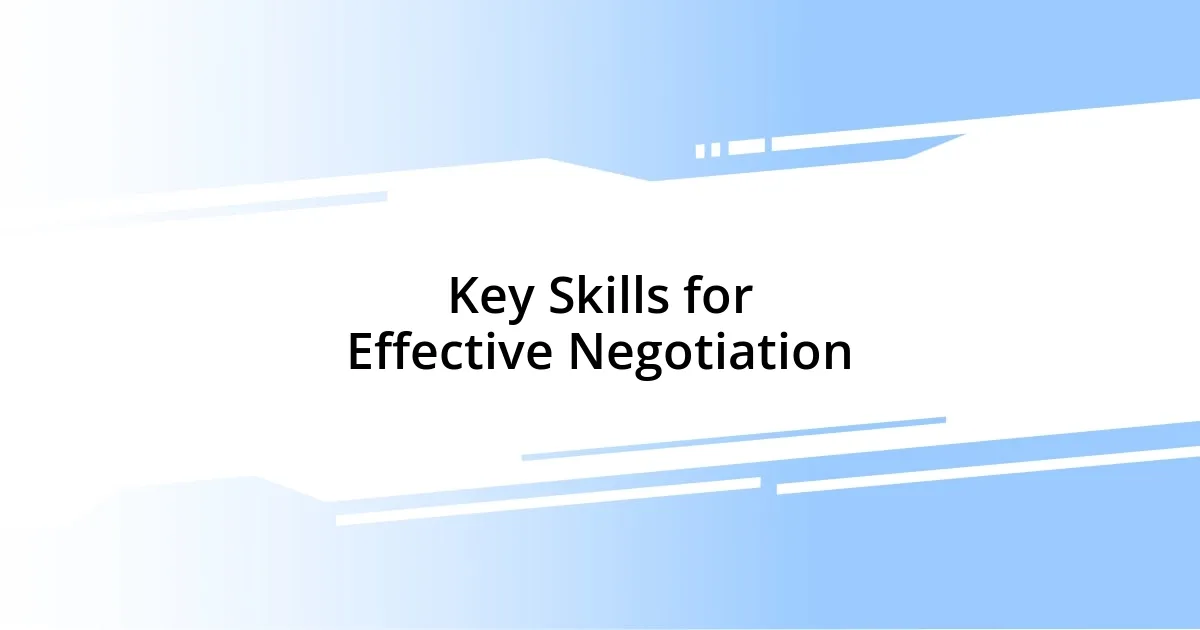
Key Skills for Effective Negotiation
When I think about negotiation skills, a few key abilities always come to mind. The most essential include effective communication and active listening. I once entered a negotiation feeling prepared, yet forgot to really hear the other person’s concerns. It was a tough lesson—I realized that understanding their perspective was crucial for finding common ground.
Here are the key skills I believe are vital for effective negotiation:
- Active Listening: Really hearing what the other person is saying shows respect and helps uncover underlying issues.
- Emotional Intelligence: Being aware of emotions—both yours and theirs—can guide you to a more empathetic approach.
- Clear Communication: Articulating your needs and wants directly reduces misunderstandings and strengthens your position.
- Problem Solving: Approaching negotiation with a collaborative mindset can turn conflicts into opportunities for innovation.
- Flexibility: Being adaptable to new information or changing circumstances is a game-changer in any negotiation.
I find that honing these skills can completely transform the negotiation process, turning potential confrontations into collaborative discussions. Each negotiation is a chance to learn and improve, especially when I focus on these core abilities.
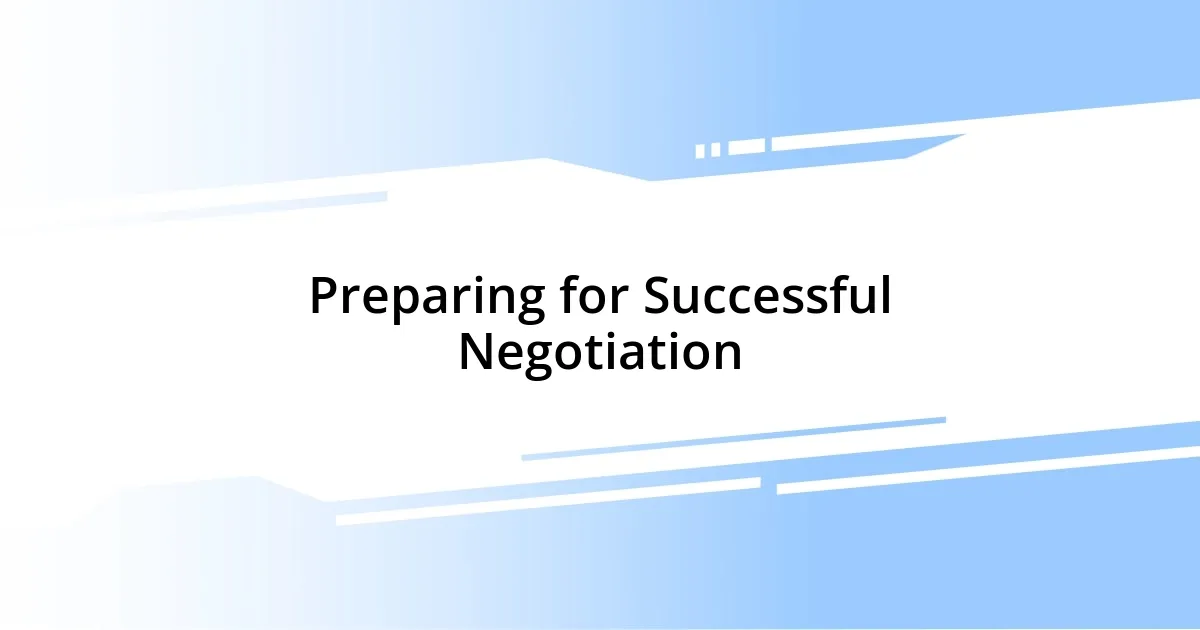
Preparing for Successful Negotiation
Preparing effectively for a negotiation is crucial. From my experience, one of the first steps is to research and gather information. Knowing the context and possible outcomes can shape your strategy significantly. For instance, I once spent hours digging into a company’s values before negotiating a contract. That understanding empowered me to align my proposals with their mission, making them more receptive to my ideas.
As I prepare, I always create a list of my priorities. This helps clarify what I want to achieve. During one particular negotiation, I outlined my main objectives and potential compromises. This pre-planning guided me during the discussion, allowing me to adapt without losing sight of what mattered most to me. The feeling of clarity in that moment was invaluable.
Visualization is another powerful tool in my preparation arsenal. Picture this: before a high-stakes negotiation, I spend a few minutes visualizing the conversation’s flow. It might sound a bit unconventional, but this practice calms my nerves and boosts my confidence. By imagining success, I walked into the meeting not just prepared, but also with a positive mindset that made a world of difference.
| Preparation Steps | Description |
|---|---|
| Research | Gather information to inform your strategy and understand the other party’s needs. |
| Prioritize Objectives | List your main goals and acceptable compromises to guide the negotiation. |
| Visualization | Imagine the negotiation flow to boost confidence and tackle nerves. |
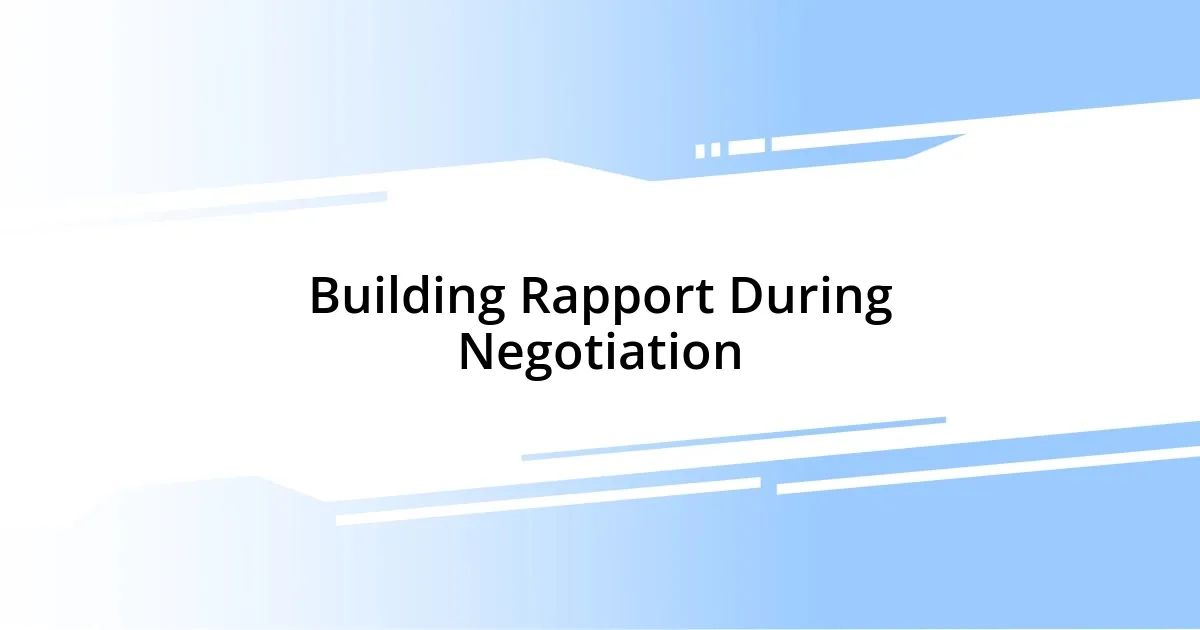
Building Rapport During Negotiation
Building rapport during negotiation is often the secret to achieving a successful outcome. I remember a time when I was negotiating with a client who seemed skeptical at first. By simply taking a few extra moments to introduce myself genuinely and share a bit about my background, the atmosphere shifted. It felt as if a barrier had been lifted, allowing us to speak more openly.
Establishing common ground can create a powerful connection. For instance, during one negotiation, I discovered that the person across the table had a shared interest in a hobby of mine. We chatted briefly about our experiences, and I noticed a remarkable change. The conversation became warmer and more cooperative, turning an initially tense discussion into a productive dialogue. Isn’t it fascinating how little personal touches can pivot the tone of a negotiation?
Ultimately, showing empathy and understanding goes a long way in building rapport. I often remind myself that behind every negotiation are human emotions and desires. On one occasion, I sensed that my counterpart was under pressure due to external factors. Acknowledging their situation not only built trust but also allowed us to work together towards a solution that satisfied both parties. When we genuinely connect, the negotiation feels less like a tug-of-war and more like a partnership.
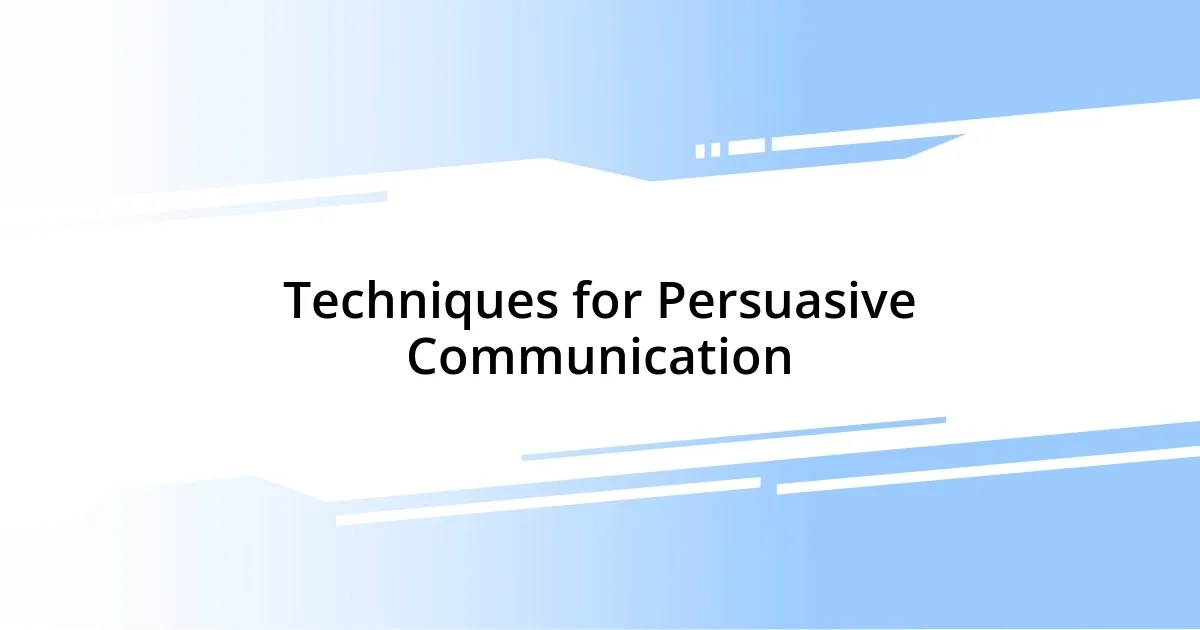
Techniques for Persuasive Communication
Persuasive communication hinges on understanding your audience. I often remind myself that the way I frame my message can significantly influence how it’s received. For example, in a recent discussion about project funding, I tailored my pitch to highlight the potential benefits for the stakeholders involved. It wasn’t just about the numbers; I painted a picture of success that resonated deeply with their aspirations, making them more inclined to agree.
Another technique I find invaluable is the use of storytelling. Sharing relevant personal experiences can make my arguments more relatable. During one particular negotiation, I recounted a challenge I faced while implementing a previous project’s strategy, illustrating how my solution not only overcame the hurdle but also led to unexpected positive outcomes. This narrative didn’t just convey facts; it engaged emotions and created a connection, making my points more persuasive.
Active listening is also a cornerstone of persuasive communication. I learned this through a negotiation where the other party expressed concerns that initially seemed trivial. By giving them my undivided attention and acknowledging their feelings, I discovered deeper issues at play. Addressing those concerns led to a more productive discussion, transforming initial resistance into collaborative problem-solving. Have you ever had an experience where simply listening turned the tide of a conversation? It’s incredible how empowering it can be for both sides.
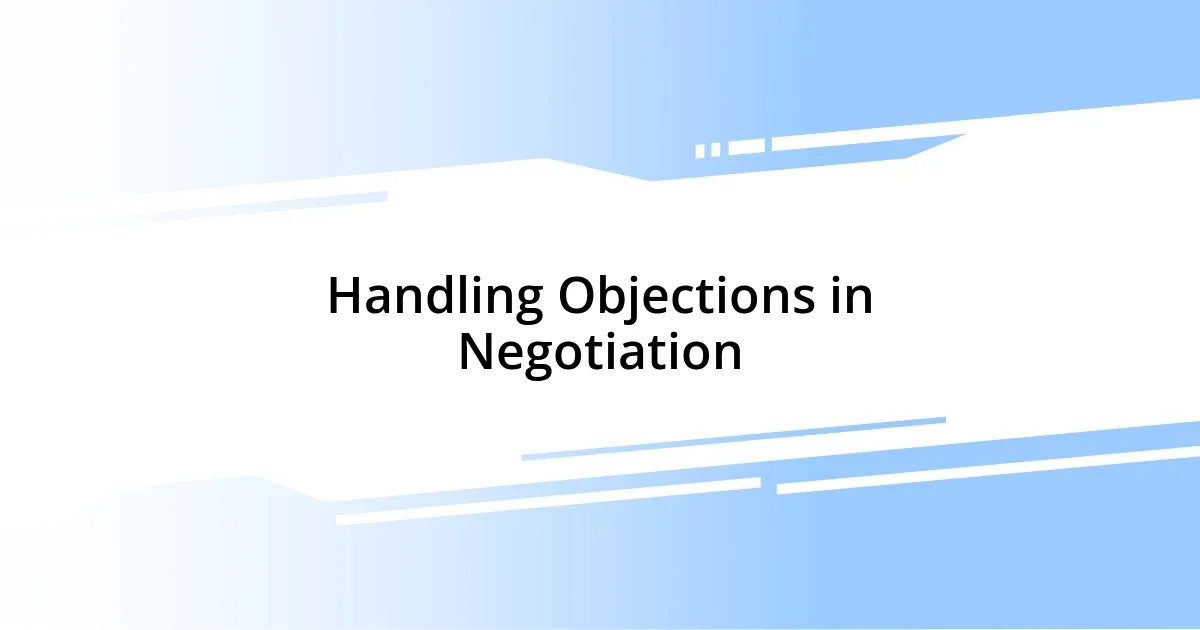
Handling Objections in Negotiation
Handling objections is a crucial skill in negotiation, and I often find that approaching them with patience pays off. One instance comes to mind when a client expressed uncertainty about my proposal’s cost. Instead of becoming defensive, I took a moment to acknowledge their concerns. By asking open-ended questions, I discovered their budget constraints were more about past experiences than the current value I was offering. This dialogue not only clarified their objections but also repositioned our conversation toward solutions.
When an objection arises, it’s important to empathize with the other party’s perspective. I remember negotiating a contract where my counterpart raised a valid concern about delivering timelines. By validating their worry, I shared a similar experience from my past that taught me the importance of balancing ambitious goals with realistic plans. In doing so, we were able to shift our focus from problem to co-creating a timeline that felt comfortable for both sides. Who doesn’t appreciate a little understanding during a tense exchange?
I’ve also learned that providing tailored solutions can transform objections into opportunities. There was a time when a stakeholder was hesitant due to perceived risks associated with my proposal. Instead of pushing back, I offered alternative options tailored specifically to address those risks. This not only alleviated their fears but also reinforced a sense of partnership. It’s fascinating how addressing objections can lead to an enhanced relationship and pave the way for mutually beneficial outcomes. How have you turned objections into stepping stones in your negotiations?
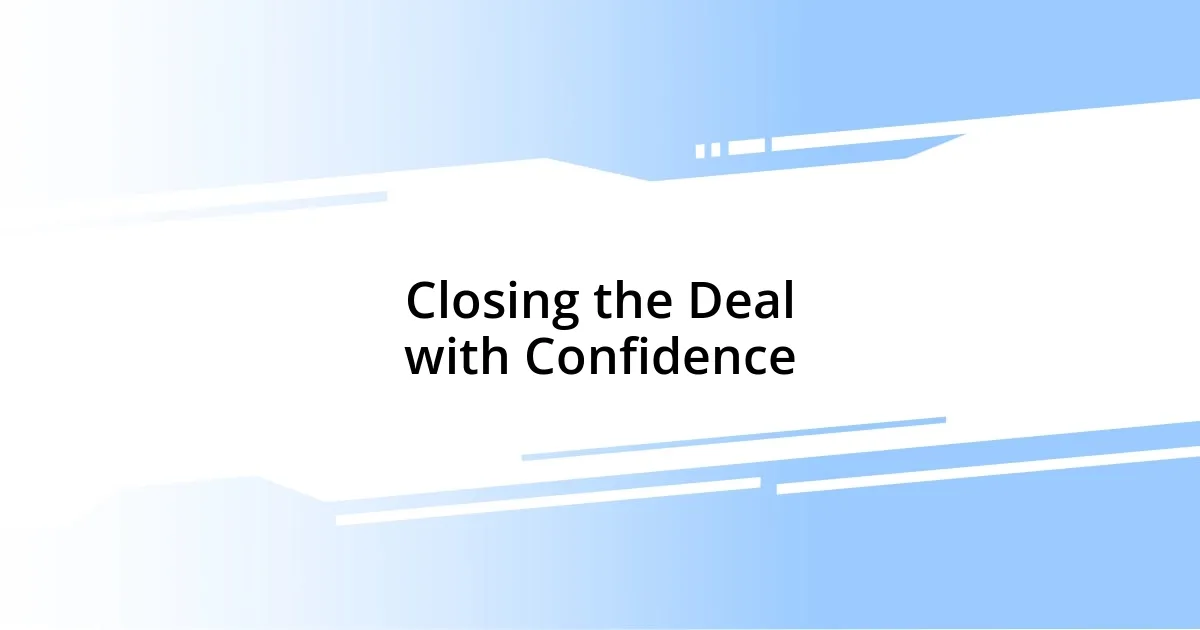
Closing the Deal with Confidence
Closing the deal with confidence is often the deciding factor in negotiation outcomes. I recall a time when I was finalizing a partnership agreement. As the conversation progressed, I made sure to maintain steady eye contact and a calm demeanor, even when discussing sensitive pricing issues. This not only reassured my counterpart but also reinforced my conviction in the deal we were crafting together. Have you ever noticed how your body language can convey assurance just as much as your words?
Another important aspect is the clarity of your closing statement. In a recent negotiation regarding a service contract, I clearly outlined the mutual benefits and timelines, followed by a straightforward request for agreement. This approach eliminated ambiguity and left no room for second-guessing. It’s incredible how a concise summary can anchor the final steps of a discussion and solidify the commitment from both parties. How often do you find clarity to be a key player in your negotiations?
Ultimately, a confident close doesn’t just happen; it’s built on a foundation of trust and rapport. During one negotiation, I emphasized the long-term vision we shared. By aligning our goals and expressing my genuine enthusiasm for the journey ahead, I reinforced the partnership’s potential. It’s amazing to see how when you project confidence, it can inspire others to commit wholeheartedly. Isn’t that the goal we all strive for in our negotiations?












